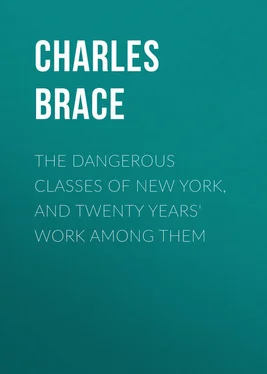Charles Brace - The Dangerous Classes of New York, and Twenty Years' Work Among Them
Здесь есть возможность читать онлайн «Charles Brace - The Dangerous Classes of New York, and Twenty Years' Work Among Them» — ознакомительный отрывок электронной книги совершенно бесплатно, а после прочтения отрывка купить полную версию. В некоторых случаях можно слушать аудио, скачать через торрент в формате fb2 и присутствует краткое содержание. Издательство: Иностранный паблик, Жанр: foreign_antique, foreign_prose, на английском языке. Описание произведения, (предисловие) а так же отзывы посетителей доступны на портале библиотеки ЛибКат.
- Название:The Dangerous Classes of New York, and Twenty Years' Work Among Them
- Автор:
- Издательство:Иностранный паблик
- Жанр:
- Год:неизвестен
- ISBN:нет данных
- Рейтинг книги:5 / 5. Голосов: 1
-
Избранное:Добавить в избранное
- Отзывы:
-
Ваша оценка:
- 100
- 1
- 2
- 3
- 4
- 5
The Dangerous Classes of New York, and Twenty Years' Work Among Them: краткое содержание, описание и аннотация
Предлагаем к чтению аннотацию, описание, краткое содержание или предисловие (зависит от того, что написал сам автор книги «The Dangerous Classes of New York, and Twenty Years' Work Among Them»). Если вы не нашли необходимую информацию о книге — напишите в комментариях, мы постараемся отыскать её.
The Dangerous Classes of New York, and Twenty Years' Work Among Them — читать онлайн ознакомительный отрывок
Ниже представлен текст книги, разбитый по страницам. Система сохранения места последней прочитанной страницы, позволяет с удобством читать онлайн бесплатно книгу «The Dangerous Classes of New York, and Twenty Years' Work Among Them», без необходимости каждый раз заново искать на чём Вы остановились. Поставьте закладку, и сможете в любой момент перейти на страницу, на которой закончили чтение.
Интервал:
Закладка:
Charles Loring Brace
The Dangerous Classes of New York, and Twenty Years' Work Among Them
DEDICATION
To the many co-laborers, men and women, who have not held their comfort or even their lives dear unto themselves, but have striven, through many years, to teach the ignorant, to raise up the depressed, to cheer the despairing, to impart a higher life and a Christian hope to the outcast and neglected youth of this city, and thus save society from their excesses, this simple record of common labors, and this sketch of the terrible evils sought to be cured, is respectfully dedicated.
INTRODUCTION
The great pioneer in the United States, in the labors of penal Reform and the prevention of crime, – EDWARD LIVINGSTON, – said as long ago as 1833, in his famous "Introductory Report to the Code of Reform and Prison Discipline": "As prevention in the diseases of the body is less painful, less expensive, and more efficacious than the most skillful cure, so in the moral maladies of society, to arrest the vicious before the profligacy assumes the shape of crime; to take away from the poor the cause or pretence of relieving themselves by fraud or theft; to reform them by education and make their own industry contribute to their support, although difficult and expensive, will be found more effectual in the suppression of offences and more economical than the best organized system of punishment." – (p. 322.)
My great object in the present work is to prove to society the practical truth of Mr. Livingston's theoretical statement: that the cheapest and most efficacious way of dealing with the "Dangerous Classes" of large cities, is not to punish them, but to prevent their growth; to so throw the influences of education and discipline and religion about the abandoned and destitute youth of our large towns, to change their material circumstances, and draw them under the influence of the moral and fortunate classes, that they shall grow up as useful producers and members of society, able and inclined to aid it in its progress.
In the view of this book, the class of a large city most dangerous to its property, its morals and its political life, are the ignorant, destitute, untrained, and abandoned youth: the outcast street-children grown up to be voters, to be the implements of demagogues, the "feeders" of the criminals, and the sources of domestic outbreaks and violations of law.
The various chapters of this work contain a detailed account of the constituents of this class in New York, and of the twenty years' labors of the writer, and many men and women, to purify and elevate it; what the principles were of the work, what its fruits, what its success.
So much interest at home and abroad has been manifested in these extended charities, and so many inquiries are received continually about them, that it seemed at length time to give a simple record of them, and of the evils they have sought to cure.
If the narrative shall lead the citizens of other large towns to inaugurate comprehensive and organized movements for the improvement of their "Dangerous Classes," my object will be fully attained.
I have the hope, too, that these little stories of the lot of the poor in cities, and the incidents related of their trials and temptations, may bring the two ends of society nearer together in human sympathy.
The discussion of the Causes of Juvenile Crime contained in this work must aid others who would found similar reformatory and preventive movements, to base them on principles and motives which should reach similar profound and threatening evils.
CHARLES LORING BRACE.
19 EAST 4TH STREET, NEW YORK.
June 1, 1872.
CHAPTER I
The central figure in the world's charity is CHRIST. An eloquent rationalistic writer – Mr. Lecky – speaking of the Christian efforts in early ages in behalf of exposed children and against infanticide, says:
"Whatever mistakes may have been made, the entire movement I have traced displays an anxiety not only for the life, but for the moral well-being, of the castaways of society, such as the most humane nations of antiquity had never reached. This minute and scrupulous care for human life and human virtue in the humblest forms, in the slave, the gladiator, the savage, or the infant, was indeed wholly foreign to the genius of Paganism. It was produced by the Christian doctrine of the inestimable value of each immortal soul.
"It is the distinguishing and transcendent characteristic of every society into which the spirit of Christianity has passed."
Christ has indeed given a new value to the poorest and most despised human being.
When one thinks what was the fate before He lived, throughout the civilized world, of for instance one large and pitiable class of human beings – unfortunate children, destitute orphans, foundlings, the deformed and sickly, and female children of the poor; how almost universal, even under the highest pagan civilization – the Greek and Roman – infanticide was; how Plato and Aristotle both approved of it; how even more common was the dreadful exposure of children who were physically imperfect or for any cause disagreeable to their parents, so that crowds of these little unfortunates were to be seen exposed around a column near the Velabrum at Rome – some being taken to be raised as slaves, others as prostitutes, others carried off by beggars and maimed for exhibition, or captured by witches to be murdered, and their bodies used in their magical preparations; when one remembers for how many centuries, even after the nominal introduction of Christianity, the sale of free children was permitted by law, and then recalls how utterly the spirit of the Founder of Christianity has exterminated these barbarous practices from the civilized world; what vast and ingenious charities exist in every Christian country for this unfortunate class; what time and wealth and thought are bestowed to heal the diseases, purify the morals, raise the character, and make happy the life of foundlings, outcast girls and boys and orphans, we can easily understand that the source of the charities of civilized nations has been especially in Christ; and knowing how vital the moral care of unfortunate children is to civilization itself the most skeptical among us may still put Him at the head of even modern social reform.
The "exposure of children" is spoken of casually and with indifference by numerous Latin authors. The comedians include the custom in their pictures of the daily Roman life, usually without even a passing condemnation. Thus, in Terence's play (Heauton: Act iii., sc. v.), the very character who uttered the apothegm which has become a proverb of humanity for all ages – "I am a man, and nothing belonging to man is alien to me" – is represented, on the eve of his departure on a long journey, as urging his wife to destroy the infant soon to be born, if it should prove to be a girl, rather than expose it. She, however, exposes it, and it was taken, as was usual, and brought up as a prostitute. This play turns in its plot, as is true of many popular comedies, on this exposition of the abandoned child.
It is frequently commented on by Roman dramatists, and subsequently by the early Christian preachers, that, owing to this terrible custom, brothers might marry sisters, or fathers share in the ruin of their unknown daughters in houses of crime.
Seneca, who certainly always writes with propriety and aims to be governed by reason, in his treatise on Anger (De Ira: i., 15), comments thus calmly on the practice: "Portentos foetus extingnimus; liberos quoque si debiles, monstrosique editi sunt, mergimus. Non ira, sed ratio est, a sanis, inutilia secernere." (Monstrous offspring we destroy; children too, if weak and unnaturally formed from birth, we drown. It is not anger, but reason, thus to separate the useless from the sound.)
Читать дальшеИнтервал:
Закладка:
Похожие книги на «The Dangerous Classes of New York, and Twenty Years' Work Among Them»
Представляем Вашему вниманию похожие книги на «The Dangerous Classes of New York, and Twenty Years' Work Among Them» списком для выбора. Мы отобрали схожую по названию и смыслу литературу в надежде предоставить читателям больше вариантов отыскать новые, интересные, ещё непрочитанные произведения.
Обсуждение, отзывы о книге «The Dangerous Classes of New York, and Twenty Years' Work Among Them» и просто собственные мнения читателей. Оставьте ваши комментарии, напишите, что Вы думаете о произведении, его смысле или главных героях. Укажите что конкретно понравилось, а что нет, и почему Вы так считаете.












